11 babies and a mum died at ‘dysfunctional’ NHS maternity unit
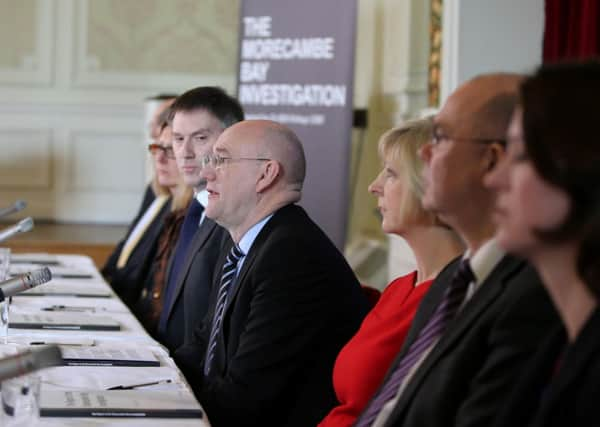

The investigation of serious incidents at Furness General Hospital in Barrow, Cumbria, between 2004 and 2013 uncovered a series of failures “at every level” from the maternity unit to those responsible for regulating and monitoring the trust which runs the unit.
Among the “shocking” problems found were substandard clinical competence, extremely poor working relationships between different staff groups and repeated failure to investigate adverse incidents properly and learn lessons.
Advertisement
Hide AdAdvertisement
Hide AdDr Bill Kirkup, who chaired the Morecambe Bay investigation, said his report detailed a “distressing chain of events” which led to avoidable harm to mothers and babies.
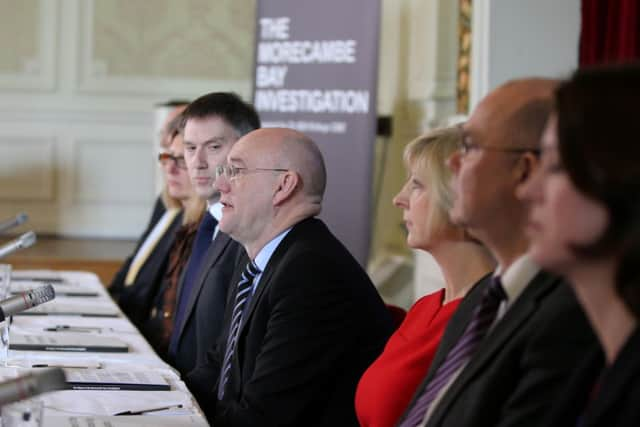

He said: “What followed was a pattern of failure to recognise the nature and severity of the problem with, in some cases, denial that any problem existed, and a series of missed opportunities to intervene that involved almost every level of the NHS.
“Had any of those opportunities been taken, the sequence of failures of care and unnecessary deaths could have been broken. As it is, they were still occurring after 2012, eight years after the initial warning event, and over four years after the dysfunctional nature of the unit should have become obvious.”
Dr Kirkup said the origin of the problems lay in the maternity service at Furness General and various factors “comprised a lethal mix that, we have no doubt, led to the unnecessary deaths of mothers and babies”.
Advertisement
Hide AdAdvertisement
Hide AdThe investigation found 20 instances of significant or major failures of care associated with three maternal deaths and the deaths of 16 babies at or shortly after birth.
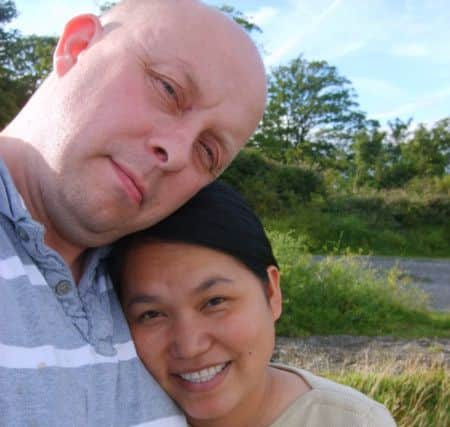

In his report, Dr Kirkup continued: “Different clinical care in these cases would have been expected to prevent the outcome in one maternal death and the deaths of 11 babies.”
He noted that was almost four times the frequency of such failures of care at the Royal Lancaster Infirmary, the other main maternity unit run by the University Hospitals of Morecambe Bay NHS Foundation Trust.
Looking ahead, he said that signs of improvement had been shown in the maternity unit, the trust and the regulatory and supervisory systems but they were “still at an early stage and there have been previous false dawns in the Trust”.
Advertisement
Hide AdAdvertisement
Hide Ad“This emphasises the importance of understanding the extent and depth of the changes necessary,” he said.
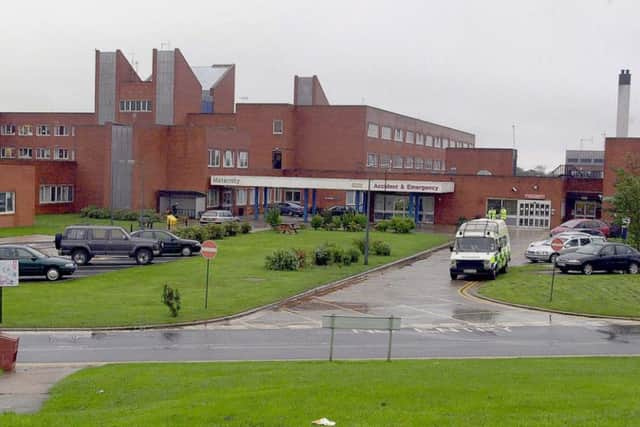

“Second, there is a clear sense that neither the Trust nor the wider NHS has yet formally accepted the degree to which things went wrong in the past and admitted it to affected families. Until this happens, there is little prospect of those families accepting that progress can be made.”
He said the events had been brought to light “thanks to the efforts of some diligent and courageous families who persistently refused to accept what they were being told”.
Dr Kirkup said: “Those families deserve great credit. That it needed their efforts over such a prolonged period reflects little credit on any of the NHS organisations concerned.
Advertisement
Hide AdAdvertisement
Hide Ad“Today, the name of Morecambe Bay has been added to a roll of dishonoured NHS names that stretches from Ely Hospital to Mid Staffordshire.
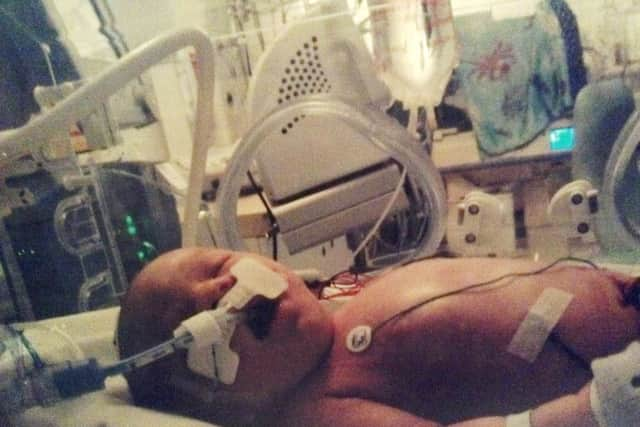

“This report sets out why that is and how it could have have avoided. It is vital that the lessons, now plain to see, are learned and acted upon, not least by other trusts which must not believe ‘that it could not happen here’.
“If those lessons are not acted upon, we are destined sooner or later to add again to the roll of names.”
The Morecambe Bay investigation was launched in September 2013 following a series of deaths of newborn babies and mothers in the maternity and neonatal services unit at Furness General Hospital in Barrow, Cumbria.
Advertisement
Hide AdAdvertisement
Hide AdHealth Secretary Jeremy Hunt, who ordered the inquiry, said at the time that the principal concern was to find answers for families about what went “desperately wrong” and to ensure there was no repeat.
Chaired by Dr Kirkup, a former Department of Health associate medical director who also served on the Hillsborough Independent Panel, the investigation has focused on the management, delivery and outcomes of care between January 2004 and June 2013.
It has reviewed all deaths during that period and the response from the Trust’s board to such “untoward incidents”.
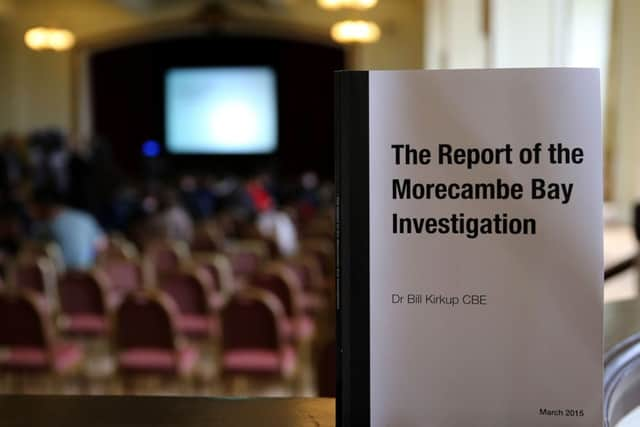

The investigation team has also looked at how the Trust reacted to a number of reports it received from 2010 onwards when it was already known that there were concerns about maternity care.
Advertisement
Hide AdAdvertisement
Hide AdThe panel looked at other maternity units run by UHMBT but only found serious concerns over clinical practice at Furness General.
Dr Kirkup said proper investigations into serious incidents as far back as 2004 would have raised the alarm but it was not until five serious incidents in 2008 that the reality began to emerge.
He said: “There was a disturbing catalogue of missed opportunities, initially and most significantly by the Trust but subsequently involving the North West Strategic Health Authority, the Care Quality Commission, Monitor, the Parliamentary and Health Service Ombudsman and the Department of Health.
“Over the next three years, there were at least seven opportunities to intervene that were missed. The result was that no effective action was taken until the beginning of 2012.”
Advertisement
Hide AdAdvertisement
Hide AdThe report made 44 recommendations for the Trust and wider NHS, aimed at ensuring the failings are properly recognised and acted upon.
A national review has also been recommended on the provision of maternity and paediatric care in rural, isolated or difficult-to-recruit areas.
In a statement, UHMBT said it had apologised unreservedly to the families involved.
Pearse Butler, the chair of the Trust Board said: “This Trust made some very serious mistakes in the way it cared for mothers and their babies. More than that, the same mistakes were repeated. And after making those mistakes, there was a lack of openness from the Trust in acknowledging to families what had happened. This report vindicates these families.
Advertisement
Hide AdAdvertisement
Hide Ad“For these reasons, on behalf of the Trust, I apologise unreservedly to the families concerned. I’m deeply sorry that so many people have suffered as a result of these mistakes. As the Chair of the Trust Board, it’s my duty to ensure that lessons are learned and that we do everything we possibly can to make sure nothing like this happens again.”
The Trust said that towards the end of the period covered by the report the whole Trust board changed, with the new board recognising the need for improvement in its maternity and neonatal service.
It said it had made a significant investment in staffing with more than 50 additional midwives and doctors, and had also improved its culture and team-working.
Jackie Daniel, the Trust chief executive, said: “We welcome these comments but we must not be complacent. We will address all the recommendations in this report to ensure that we further improve the services we offer to women and families, across our hospitals.”